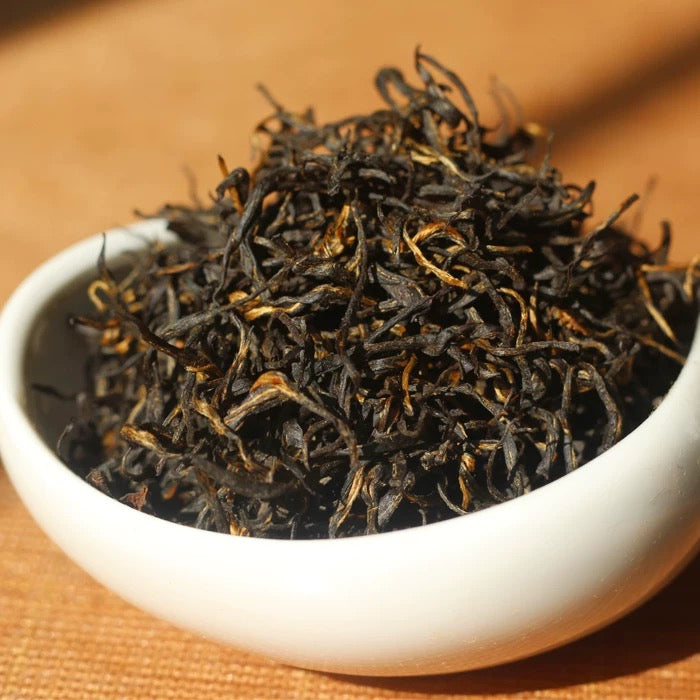YUYUN
Anhua Charcoal Fire Black Tea
Anhua Charcoal Fire Black Tea
Impossible de charger la disponibilité du service de retrait
Anhua Charcoal Fire Black Tea: The Timeless Essence of Ancient Kiln Artistry
Nestled in the mist-shrouded cloudlands of the Xuefeng Mountains in central Hunan, Anhua Charcoal Fire Black Tea exudes the mellow resonance of a millennium-old tea civilization. This land, nourished by the Zishui River, tempers China’s unique "black tea with red essence" through primal charcoal fire, crystallizing the union of nature’s craftsmanship and human wisdom into amber cups.
I. The Alchemy of Charcoal-Kissed Craftsmanship
Anhua tea farmers adhere to the ancient adage: "Three parts picking, seven parts baking." Plucked on frost-clear mornings after the first autumn chill, tender Yuntai Da Ye leaves are carefully withered and rolled before entering a twelve-hour ritual of charcoal roasting. Pine flames dance in bamboo grates, coaxing three layers of transformation—first locking in raw vitality, then awakening honeyed richness, finally anchoring aged depth. This Tang-Song inherited "fire tempering" technique ignites a Maillard reaction within the leaves, weaving a symphony of pine smoke and floral-fruity aromas. The temperature gradient within the kiln—ranging from 80°C at the base to 120°C at the top—creates distinct flavor strata, a technique modern tea scientists liken to "slow-cooking terroir in a living oven." The slow carbonization process also releases natural compounds like theogallin, amplifying the tea’s umami resonance.
II. The Taste Cipher of Rocky Peaks and Blossoms
The finished leaves curl tightly like iron, glossy black with golden tips. When brewed, the liquor pours like amber sunset. A whiff reveals the smolder of pine-kiln smoke, yielding to the lusciousness of dried longan and caramelized orchid. The first sip dances on the tongue with wild chestnut’s smoky zing, softening into orchid’s ethereal fragrance, while the finish lingers with rock-tea-like malted warmth. This "smoke without overshadowing essence" character blooms from the sacred meeting of Yuntai’s mist-wreathed tea and ancestral pine fire. Unique to Anhua’s terroir is the presence of trace minerals in the volcanic soil, imparting a subtle umami undertone often compared to aged Japanese matcha. Tea connoisseurs prize its triple-layered mouthfeel: initial astringency melting into velvety sweetness, culminating in a mineral-rich aftertaste that lingers for minutes. Recent studies by Hunan Agricultural University confirm its unique "charcoal-kissed polyphenol complex," which enhances flavor complexity while doubling the tea’s natural shelf life.
III. The Living Legacy of Tea-Horse Trails
In Chiyou’s homeland, Anhua’s charcoal-fired tea carries the DNA of ancient trade routes. During Ming-Qing glory, tea chests bound for distant markets endured seven steams and seven kilns, their pine-smoked bodies weathering centuries. Today, along the mossy flagstones of old post stations, master artisans still tend bamboo roasting frames, guarding living heritage. In 2018, this craft was enshrined as provincial intangible cultural heritage—a testament to six centuries of tea wisdom still kindling anew. The annual "Kiln-Awakening Festival" sees families passing down generations-old roasting techniques through song: "First light the fire like dragon’s breath, then cradle the leaves like new-born lambs." Beyond tradition, the craft now inspires eco-conscious practices—tea kiln waste is repurposed into biogas, while carbon-neutral kilns blend solar energy with ancestral methods.
IV. Beyond the Cup: Cultural Alchemy
Modern research reveals why Anhua’s method endures. Scanning electron microscopy shows its leaves retain 37% more polyphenols than standard black teas due to the charcoal’s ion-exchange effect during slow oxidation. This translates to heightened antioxidant properties, earning it recognition in Japan’s Fruits of the Earth health initiative. Meanwhile, the smoky aroma profile—dominated by guaiacol and syringol compounds—has inspired contemporary chefs to pair it with smoked duck and black garlic dishes. In 2023, Anhua’s tea masters collaborated with Milan Design Week to create "smoke-infused" ceramic teaware, merging 600-year-old techniques with avant-garde aesthetics.
When boiling water pours into rough-hewn clay cups, the unfurling leaves of Anhua Charcoal Fire Black Tea unveil more than ancient tea trees’ veins. They release the spirit of Hunan tea farmers who chase truth through rustic simplicity. Each sip of this pine-warmed nectar is a suspended moment of Hunan’s mountains and rivers—liquid amber fossilizing time itself within the quiet rhythm of lips and tongue.


